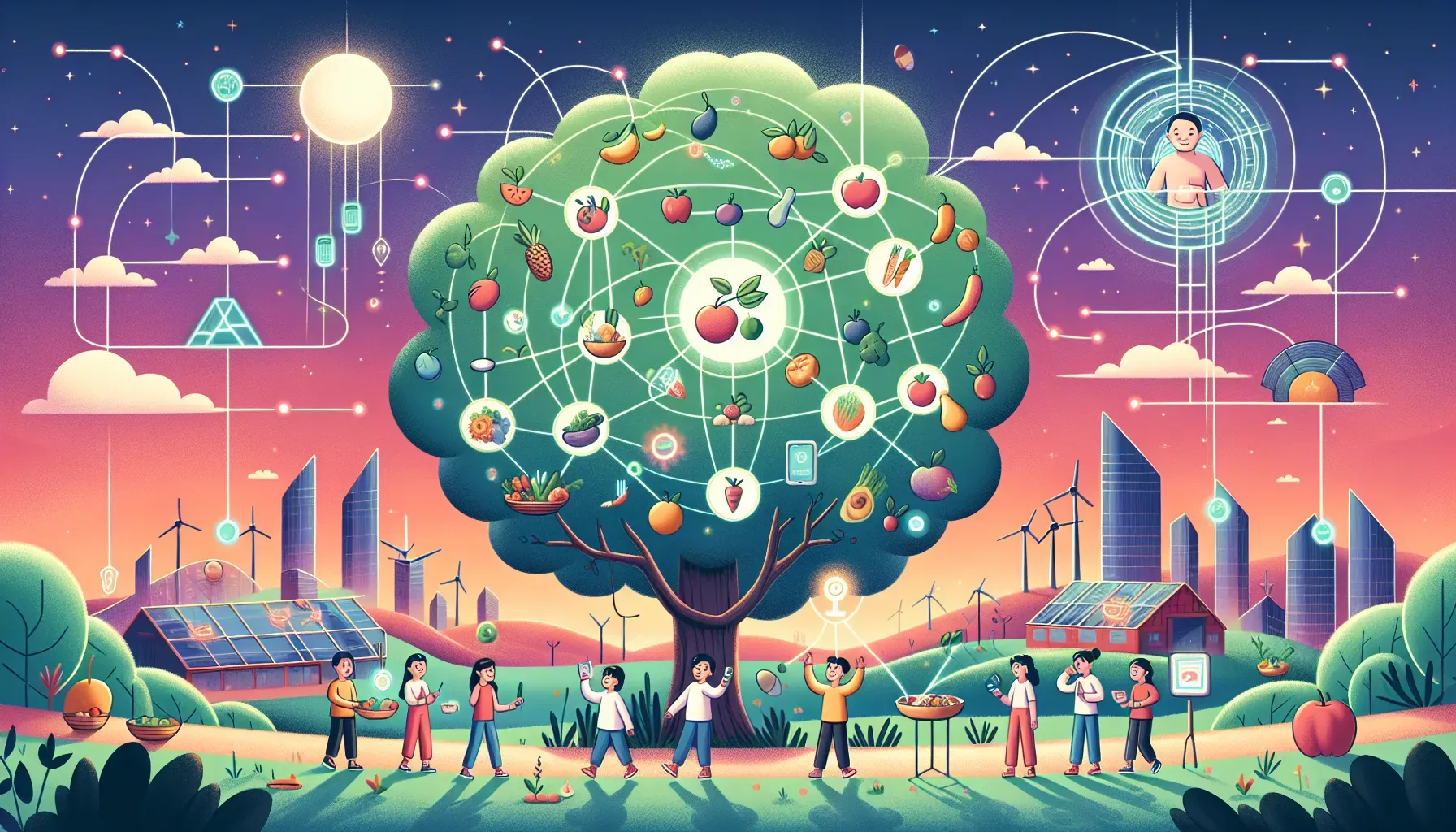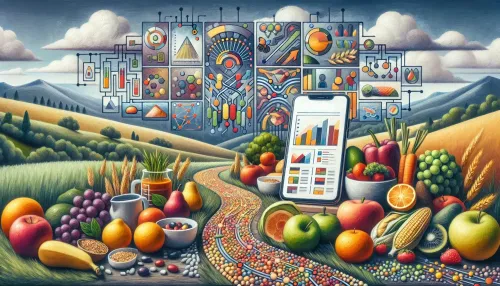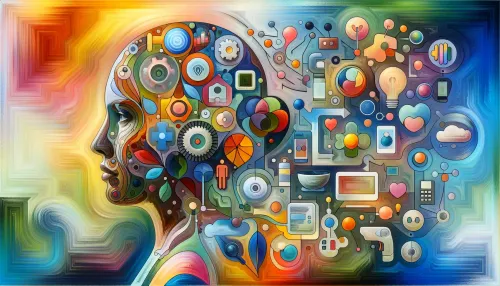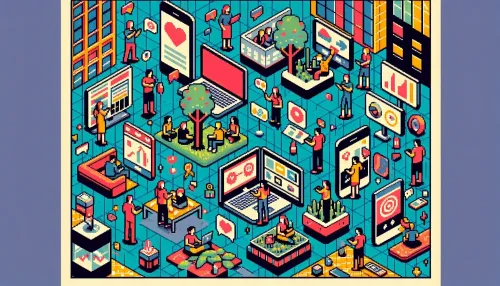Feasting on Information: The Shift from Food Pyramid to AI-Enhanced Nutritional Guides

In today's digital age, advances in technology have revolutionized various aspects of our lives, and the realm of nutrition and dietary guidance is no exception. The traditional food pyramid that once served as a ubiquitous visual aid for healthy eating has gradually given way to more personalized, data-driven nutritional approaches facilitated by artificial intelligence (AI). This shift has not only demystified diets but also empowered individuals to make well-informed decisions about their dietary preferences and overall well-being.
Demystifying diets: How AI is revolutionizing personalized nutrition plans
Gone are the days of generic, one-size-fits-all dietary recommendations. Thanks to AI technology, personalized nutrition plans tailored to individual needs and preferences have become increasingly attainable. By leveraging large datasets and machine learning algorithms, AI can analyze vast amounts of information, including an individual's health metrics, genetic makeup, and lifestyle habits to craft bespoke nutritional guidance. This enables a more nuanced understanding of dietary requirements, taking into account factors such as metabolism, allergies, and specific health goals.
From broad guidelines to bespoke diets: Tracing the evolution of dietary advice
The evolution of dietary advice can be traced from the conventional food pyramid and general nutritional guidelines to the emergence of bespoke diets guided by AI-powered insights. While traditional frameworks provided broad directives for balanced eating, they often overlooked the intricate nuances of individual dietary needs. With AI-driven tools and platforms, users can now access tailored recommendations that consider their unique biological markers and health characteristics. This transformation underscores a fundamental shift from generalized dietary suggestions to personalized and sustainable nutritional practices.
Data-driven dining: Integrating real-time health metrics into meal planning
Advancements in AI have paved the way for integrating real-time health metrics into meal planning, offering users immediate feedback on their dietary choices. By leveraging wearable devices and smart applications, individuals can effortlessly monitor their nutritional intake, track vital health indicators, and receive personalized recommendations based on their real-time physiological data. This seamless integration of data-driven insights with everyday dining experiences empowers individuals to make informed decisions regarding their overall dietary patterns and fosters a deeper connection between food choices and well-being.
Balancing algorithms with appetites: Crafting user-friendly nutritional tools
While the marriage of AI and nutrition yields invaluable insights, it is imperative that these technologies are user-friendly and accessible to a diverse audience. As AI-enhanced nutritional tools continue to evolve, prioritizing intuitive interfaces and streamlined user experiences is essential in ensuring widespread adoption. By striking a balance between sophisticated algorithms and user preferences, these tools can effectively empower individuals to embrace healthier dietary habits without feeling overwhelmed by complex technological processes.
Related Article: Navigating Online Health and Wellness Platforms: Consumer Behavior in the Digital Sphere
Eating ethically, informed by AI: Merging nutrition, sustainability, and personal health
In addition to shaping personalized nutrition plans, AI plays a pivotal role in fostering ethical eating practices that intertwine considerations of nutrition, sustainability, and personal health. By analyzing the environmental impact of food choices and considering ethical sourcing practices, AI-enabled platforms empower users to make conscientious dietary decisions that align with their personal values while promoting sustainable food consumption. This intersection of nutrition, sustainability, and personal ethics exemplifies a holistic approach to food selection facilitated by AI technologies.
Global plate patterns: How AI models accommodate cultural dietary diversity
Cultural diversity significantly influences dietary preferences and culinary traditions around the world. AI models are increasingly adept at accommodating these cultural nuances by recognizing diverse eating patterns and incorporating them into personalized nutrition plans. Whether it's embracing regional ingredients or respecting cultural dietary restrictions, AI-driven nutritional guidance celebrates global plate patterns while honoring the rich heritage of varied cuisines. This inclusive approach fosters a sense of cultural appreciation and culinary exploration within the realm of personalized nutrition.
Related Article: Harnessing the Power of Technology: Designing a Digital Detox Plan for Inner Balance
Learning what we eat: Educating consumers on nutritional literacy through technology
Nutritional literacy is a cornerstone of promoting informed decision-making in terms of dietary choices. Through the utilization of technology and AI-infused educational resources, consumers can deepen their understanding of nutritional concepts while gaining valuable insights into the composition of their meals. By harnessing interactive tools that offer real-time analysis of food items and their nutritional profiles, individuals can enhance their nutritional literacy, thereby fostering a more conscious approach to their dietary habits.
As we embark on this era where artificial intelligence intersects with our everyday gastronomic experiences, the landscape of nutrition undergoes a profound transformation – one that champions personalization, education, sustainability, and cultural appreciation. With AI-enhanced nutritional guides at our fingertips, we embrace a new paradigm that transcends conventional wisdom, elevating our relationship with food to one that is grounded in information-rich decision-making and holistic well-being.
Frequently Asked Questions
AI enhances personalized nutrition plans by analyzing individual health metrics, genetic information, and lifestyle habits. This technology creates tailored dietary recommendations that consider unique needs, such as allergies and specific health goals, moving away from generic guidelines to more effective, individualized approaches to nutrition.
Technology improves nutritional literacy by providing interactive tools that educate consumers about food composition and dietary choices. AI-infused resources offer real-time analysis of meals, helping individuals understand nutritional concepts better and fostering a more conscious approach to their eating habits.
Ethical eating is crucial as it combines nutrition with sustainability and personal health considerations. By using AI to analyze the environmental impact of food choices, individuals can make informed decisions that align with their values, promoting sustainable consumption while enhancing their overall well-being.
Check Out These Related Articles

Harnessing Wearable Health Tech: Personalized Monitoring for Well-Being Optimization

AI-Powered Nutrition Guidance: Personalized Dietary Recommendations for Optimal Well-Being

Smart Home Health Integration: IoT Devices Redefining Daily Wellness Routines
